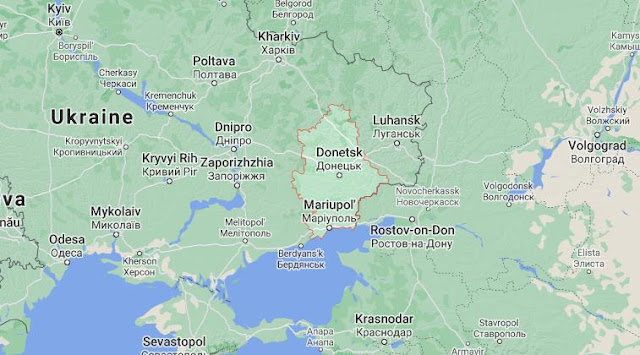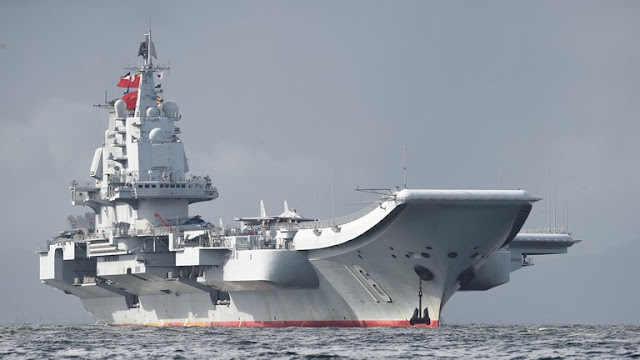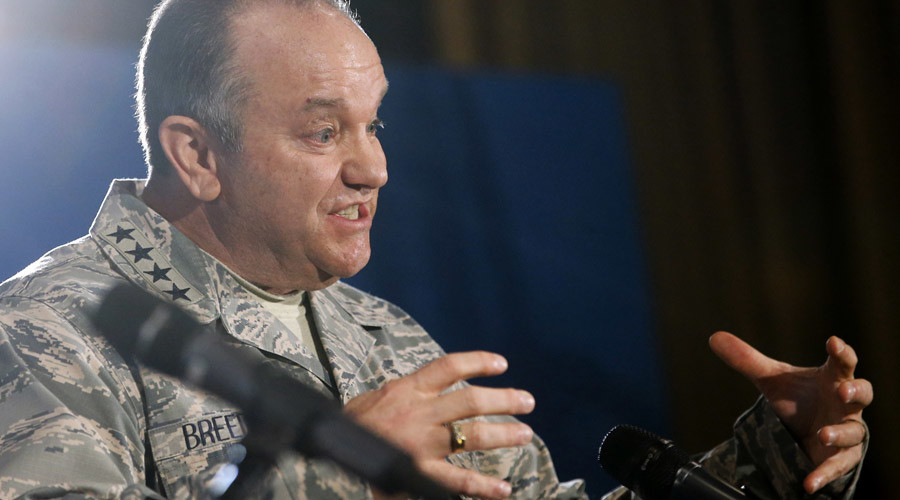NATO has been too successful at doing the wrong thing
2 Dec, 2021 06:45
FILE PHOTO: A soldier sits in a tank as a NATO flag flies behind during the NATO Noble Jump military exercises of the VJTF. © Getty Images / Sean Gallup
By Tarik Cyril Amar, a historian from Germany at Koç University in Istanbul working on Russia, Ukraine, and Eastern Europe, the history of World War II, the cultural Cold War, and the politics of memory. He tweets at @tarikcyrilamar.
NATO and Russia are facing off once again. At the center of the new cycle of mutual warnings and brinkmanship is Ukraine, which, despite being refused immediate admission to NATO, has become a major issue for Western leaders.
The US-led military bloc is accusing Moscow of planning a large-scale invasion and claims that such a move would have grave consequences. Russia rejects the accusation and, in turn, has warned NATO that its expansion in Ukraine, whether by a formal membership or informally by other means of military cooperation and infrastructure, is a red line for Moscow.
There is broad consensus that this is a dangerous situation that the world could do without. Even with no one really wanting large-scale war, an escalation is, of course, possible, be it by accident or by malevolent actors. Especially in this case, given Ukraine’s far-right forces are not really under Kiev’s control, and are exploiting high tension for provocation. It is also clear that such a war would be catastrophic. In the “best” case, the actual fighting would remain limited to Ukraine, which would be devastated, while the political and economic consequences would be global. In the worst case, the fighting would spread beyond Ukraine and could involve the use of nuclear weapons.
How did we get here? One answer is simple and misleading: just blaming Russia will not do. Because if you, unrealistically, assign all responsibility to the other side of a conflict, then you cannot even begin to think about what your own side could do better. If that’s too abstract, think about how we got through the Cold War without blowing up the world. In essence, by three things: a mix of sheer undeserved luck, obstinacy, and compromise.
We can only hope about the luck. But the other two components of that proven humanity-survival recipe are up to us: While Cold War reenactors love to recall the obstinacy (or “determination”), they forget about the compromise. And yet, we are still here because compromise is how the Berlin crises and the Cuban missile standoff ended, for instance. No compromise, no world. Yes, as simple as that. Not always, but at decisive turning points.
But to be able to find a compromise, you have to do two difficult things: exercise empathy with your annoying opponent, and be self-critical. Put simply, accept that your potential enemy usually also has a point; and question your own assumptions, aims, and demands.
Is the West able to do so at this point? By far not well enough. Part of the reason is that NATO itself has become an obstacle to a genuine rethink. Not so much by its existence as by its increasingly ideologized self-understanding. Of course, an organization born in the Cold War has always been ideological. Yet during the Cold War, the base reality of the superpower standoff overshadowed the superstructure of ideology.
Symptomatically, however, NATO is now an organization that invests heavily and proudly in “strategic communications,” “outreach,” “branding,” and other forms of public relations. Make no mistake, these activities long predate the crisis of 2014 or any Russian efforts at “information war.” It was in 2010 that a NATO Deputy Assistant Secretary General for Public Diplomacy explained – in oddly colonial terms – that her organization was engaged in a constant “battle for hearts and minds.”
Even if we politely refrain from calling such activities propaganda, there is a hefty, usually overlooked cost to them: They may look a little comical, with, for instance, sophisticated manuals on visual branding that illustrate such things as where to put the NATO logo on an umbrella. But they have a scary side: What if NATO’s leaders believe their own branding? Because that is a perennial problem with engaging in propaganda: You can start believing your own act.
In NATO’s case, this tendency is boosted by the manner in which it has prospered after the Cold War. With now 30 members (the most recent one, North Macedonia, joined in 2020), the alliance was founded in 1949, at the dawn of the Cold War. That conflict ended more than thirty years ago. Unlike the Warsaw Pact, its great Cold War adversary, NATO did not abolish itself after its end: The East’s main military alliance of the Cold War lost its purpose and disappeared. The West’s main military alliance of the Cold War also lost its purpose but set out to do, in essence, two things: reinvent its reasons to exist and expand. Both processes have not stopped to this day.
In terms of purpose, NATO presents itself as not only a military, but also a political alliance, promoting “democratic values” and peace, while ready for military action if needed.
The geographical scope of its post-Cold War missions and activities has been wide.
Current locations include Kosovo, the Mediterranean, Iraq, Africa, Albania, Montenegro, Slovenia and the Benelux countries as well as the Baltic region. Already finished are involvements in Afghanistan, the Gulf of Aden, at the Horn of Africa, Libya, Sudan, North Macedonia, and Bosnia-Hercegovina. Most recently, NATO has predictably obeyed its American hegemon and started making noises about China.
As the involvement in Libya and Afghanistan have demonstrated with brutal clarity, the bloc’s ongoing search for a purpose has led to mixed results. Some post-Cold War NATO activities have made sense, others have not, and some have contributed to abysmal fiascos. The recent turn against China is likely to be nonsensical rhetoric at best, but it has already provoked a fierce Chinese response.
Whatever its actual post-Cold War record, in terms of expansion, NATO has done very well for itself. At the end of the Cold War it had 16 members, now it has 30, and it won’t call an end to its permanent acquisition spree.
Critics exist. Some attack the bloc for still being there. In their view, it has long outlived its role and should have dissolved after the end of the Cold War, perhaps to be replaced by a different organization. More down-to-earth complaints include its lack of focus and the uneven sharing of its burdens among its members.
More specifically, NATO’s massive and – historically – rapid eastward expansion has triggered continuing debates between those incorrectly denying that it broke assurances made to the Soviet leadership, and thus, practically Russia, and those who, plausibly and with evidence, acknowledge that fact. The bloc’s current activities in eastern and southeastern Europe, especially in the Baltic and Black Sea areas, also receive widely differing assessments. Presented by many as nothing but a reasonable response to Russia’s activities, especially with regard to Ukraine, to more cautious observers, they disregard legitimate Russian security interests and thus risk unnecessary escalation.
This brings us back to NATO’s underlying problem. In essence, the post-Cold War alliance has been too successful at doing the wrong thing, namely being promiscuous about its purpose and developing an ideology of over-reach. NATO might be winning its “battle for hearts and minds.” Tragically, the minds it is defeating seem to be, most of all, its own. Caught in a flattering self-image as a global force of democratic redemption, the vision of its leaders is blurred. Not by the fog of war, but of self-imposed ideology.
In that respect, the fresh standoff over Ukraine is a call to go back to basics: NATO is good at being a defensive security alliance with clearly delimited borders. But, as a free-floating, ever expanding “democracy”-promotion machine on a global crusade, it is confused and destabilizing. Here’s the irony – or tragedy: NATO survived the end of the Cold War, for better and for worse, by cutting itself loose from its original purpose. Now, precisely because tension with Russia is back, it is time to remember that and stop the endless search for new missions and new members.
Another excellent column by Tarik Amar, however, I am convinced that NATO is not only establishing a raison d'etre, but their primary function is no longer the safety and well-being of its members, but is ultimately the sale of weapons and weapons systems to members and by members to anyone they can scare the daylights out of.

Russia says military action in Ukraine highly likely
2 Dec, 2021 10:09
FILE PHOTO. © Scott Peterson / Getty Images
Follow RT onRT
By Layla Guest
The risk of an all-out armed conflict in south-eastern Ukraine is extremely high and is becoming a matter of grave concern for Russia, Moscow has cautioned, as international tensions heighten over the war-torn Donbass region.
Speaking to reporters on Thursday, Kremlin press secretary Dmitry Peskov said that “the probability of hostilities in Ukraine is still high” when asked about the likelihood of a war in the country’s east.
“This is a matter of particular concern and worry for us,” he added.
Peskov's remarks come a day after Russia’s foreign ministry spokeswoman alleged that Kiev was significantly beefing up its military force in the region by “pulling heavy equipment and personnel” into the area.
“According to some reports, the number of troops… in the conflict zone already reaches 125,000 people," Maria Zakharova said on Wednesday.
"This, if anyone does not know, is half of the entire composition of the Armed Forces of Ukraine," she added.
Tensions on the Russian-Ukrainian border have grown in recent weeks. Speaking on the same day at the Kiev Security Forum, US Under Secretary of State for Political Affairs Victoria Nuland warned Russia against making any moves “to internally destabilize Ukraine or use these forces to enter the country.”
Should Russia’s military do so, she insisted, Moscow “will be met with high-impact economic measures, the likes of which we have not used before, from all of [NATO,]” she insisted.
The Kremlin, however, has consistently rejected claims made by the US-led military bloc and Western media reports that Moscow is massing its military along the frontier line with Ukraine, blasting the claims as “hysteria.”
Peskov also insisted that Russia poses no threat to anyone, and that “the movement of our armed forces on our own territory should be of no concern to anyone.”

Mossad tricks Iranian scientists into helping blow up nuclear site – media
3 Dec, 2021 12:40
The Natanz uranium enrichment facility buildings in Natanz, Iran. © Getty Images / Stringer
Israeli intelligence agency Mossad masterminded the destruction of a major Iranian nuclear facility and recruited a team of local scientists, the Jewish Chronicle has reported.
“Up to 10 scientists were approached by Israeli agents and agreed to destroy the underground A1000 centrifuge hall at Natanz in April,” the newspaper claimed on Thursday, adding that the Iranians thought they were working for “international dissident groups."
The alleged Mossad operation involved smuggling some explosives into the nuclear compound in food boxes and dropping others in by drone, with scientists collecting them.
The destruction of the plant on April 11, according to the Jewish Chronicle, “caused chaos in the highest echelons of the Iranian leadership,” delayed “progress towards a bomb” and disabled the complex for up to nine months.
The outlet claims this was one of three “connected Mossad operations that took place over an 11-month period of sabotage in Iran.”
The first took place in July 2020 and targeted the Natanz complex and the third in June 2021 involved “a quadcopter assault on the Iran Centrifuge Technology Company.”
“The three operations were planned together over an 18-month period by a team of 1,000 technicians, analysts and spies, as well as scores of agents on the ground,” reads the article.
The report comes a day after the Israeli Prime Minister Naftali Bennett in his conversation with US Secretary of State Antony Blinken called for “immediate cessation of negotiations” with Iran on reviving the 2015 nuclear deal. He claimed Tehran was using “nuclear blackmail” as a negotiation tactic. Iran has consistently denied having nuclear weapons ambitions, insisting its uranium enrichment serves purely civil purposes.
Iran earlier blamed Israel for the Natanz plant explosion and named Reza Karimi as a suspect, saying he had fled the country ‘hours before’ the incident. There has been no comment from Iranian authorities on the Jewish Chronicle’s report.
After former US president Donald Trump unilaterally abandoned the 2015 Joint Comprehensive Plan of Action (JCPOA) agreement and reimposed crippling sanctions, Iran began to enrich uranium beyond the limits agreed in the deal, raising concern in the West. The country says it will not agree to revive the agreement unless all the sanctions against it are lifted.


























